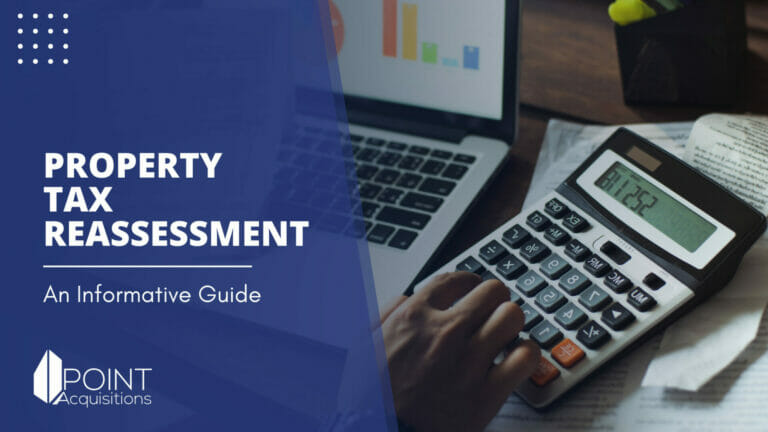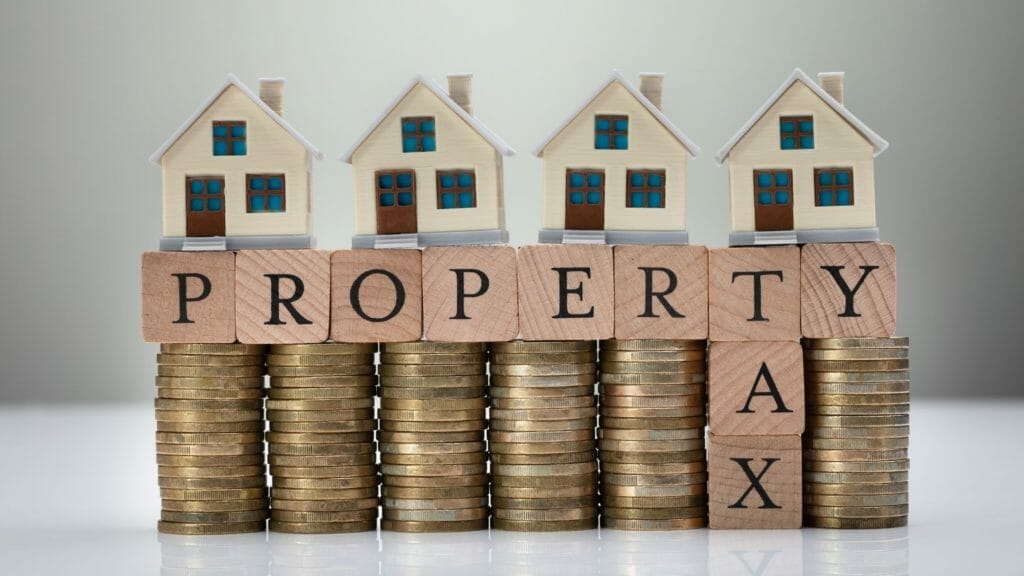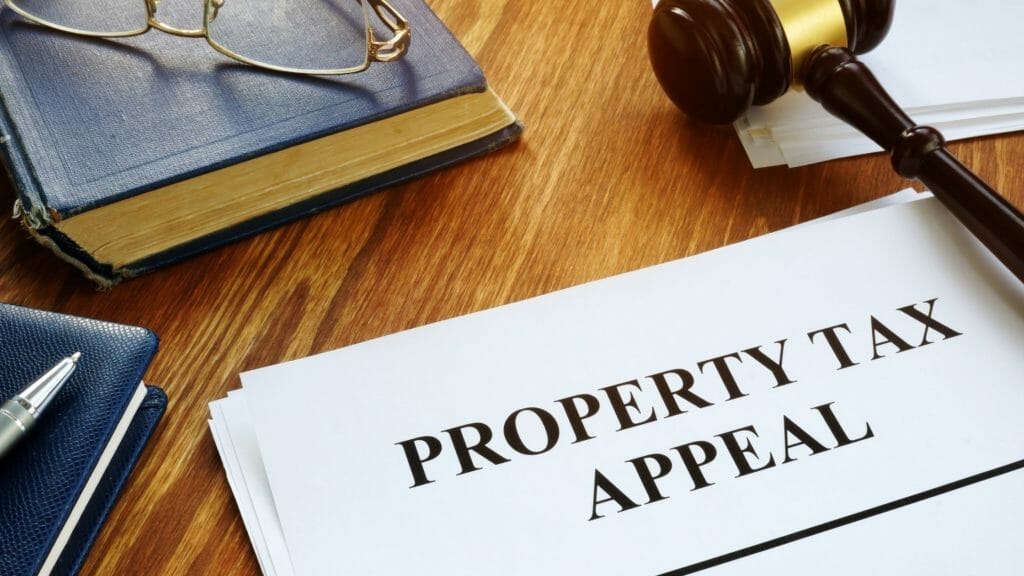
What is Property Tax Reassessment?
Property tax reassessment is the process where the value of a property is periodically reevaluated for tax purposes. This typically occurs following changes in ownership, significant renovations, or on a regular schedule established by local laws, which can range from one to five years.
When it comes to property taxes, most investors think about the annual tax bill that they need to pay. However, another important aspect of property taxes that investors should be aware of is property tax reassessment.
Understanding the reassessment process is important for investors to anticipate potential changes in their property tax obligations. Municipalities conduct reassessments to guarantee tax fairness and accuracy, reflecting the property’s current market value. Should a property be reassessed at a higher value, investors face higher tax bills, affecting the overall return on investment.
Reassessments can also work in favor of the property owner if the property’s value decreases, leading to lower taxes. Property owners have the right to appeal reassessments if they believe them to be inaccurate. Talking with a property tax attorney can be helpful, as they can offer expert guidance through the appeal process, attempting to secure a fair valuation and, ideally, reduce the property tax burden.
This professional assistance can be necessary in dealing with the complexities of local tax laws and reassessment procedures, making sure that property owners are not unduly penalized by incorrect valuations.

Table of Contents
Reasons for Property Tax Reassessment
Property tax reassessments are triggered by several factors, each aimed at ensuring that the taxation on properties remains fair and current with market conditions. Besides the periodic reviews mandated by local statutes, certain events prompt a reassessment of a property’s taxable value.
- Market Fluctuations: Significant shifts in the real estate market can lead to reassessments. If a particular area sees a surge in market prices due to economic growth, gentrification, or increased demand, local tax authorities may reassess property values to align tax liabilities with current market conditions.
- Infrastructure Improvements: Upgrades to local infrastructure such as new schools, roads, or public utilities can increase property values. Properties in these improved areas may be reassessed to reflect their increased worth due to the benefits gained from local enhancements.
- Environmental Changes: Changes in the environment surrounding a property, such as flood risk or other natural factors, can affect property values either positively or negatively. Properties may be reassessed to account for these new risk levels or enhancements.
- Zoning Changes: If the zoning regulations in an area are modified, property values can be affected. For example, a change from residential to commercial zoning usually increases the value of the property due to higher potential usage, prompting a reassessment.
These factors make sure that property taxes paid by owners are proportional to the actual value of their properties, thereby maintaining equity and fairness in the tax system.
The Impact of Reassessment
Reassessment can have a significant impact on an investor’s property tax bill. For example, if an investor buys a property for $100,000, and the local tax rate is 2%, the annual property tax bill would be $2000. However, if the property is reassessed at $120,000, the annual property tax bill would increase to $2400.
Investors should keep reassessment in mind when evaluating a potential investment property. It’s essential to research the frequency of reassessment in the municipality where the property is located. Additionally, investors should factor in the possibility of a reassessment when estimating their annual expenses for a particular property.
How Reassessment Works
Property taxes are a source of revenue for state and local governments. To make sure that property taxes are fair and accurate, most states require that properties be reassessed regularly. Property tax assessors are generally county-, city-or township-level officials responsible for assessing and reassessing property within their jurisdiction. The reassessment is handled at the local level, but state law determines how often property in the state is reassessed.
How often are homes reassessed? Intervals of reassessment between appraisals vary from one to 10 years, depending on the state. Reassessment intervals can also vary depending on the type of property. In some states, properties are reassessed every year (for example, in Alaska or Arizona), while in others – once every ten years (for example, Connecticut), and in some – whenever the change of ownership occurs, like in California. To learn the reassessment interval in your state, check out this website.
Residential properties are typically reassessed more frequently than commercial properties. Regular reassessment makes sure that property taxes are based on the property’s current value, providing a fair and stable source of revenue for state and local governments.
What to Expect After Your Property Is Reassessed
The property tax assessor calculates the fair market value after it is reassessed based on the location and property type. The technique for determining this value will differ depending on the current location.
After the reassessment is finished, many property tax offices will contact the owner to inform them of the new assessment results. If the property owner thinks the reassessment is incorrect, they have a right to challenge or appeal it.
Reassessment does not guarantee that property taxes will rise. The property value and the real estate market in an area will influence the results. If the value of the real estate in the region is declining, a reassessment might result in decreased property taxes for an owner. A reassessment may also produce no change in the property’s value.

How Reassessment Affects Property Taxes
Reassessment can have varied impacts on property taxes, influencing both the amount property owners are required to pay and the allocation of tax revenue among local services. The direct effects are often seen in the adjustment of a property’s assessed value, which serves as the basis for calculating the property tax due.
- Adjustment of Tax Bills: When a reassessment results in an increased assessed value, the property tax bills typically rise accordingly. This adjustment reflects the property’s current market value and guarantees that owners contribute a fair share to community funding based on this value. Conversely, if the reassessment leads to a lower property value, the owner may see a decrease in their tax bill, providing some financial relief.
- Revenue for Local Services: The implications of reassessment extend beyond individual tax bills to affect community funding. Higher property values resulting from reassessments increase the tax base, allowing local governments to generate more revenue without increasing the tax rate. This additional revenue can support enhancements in public services such as education, emergency services, and public parks.
- Equitable Distribution of Tax Burden: Reassessments help make sure that property taxes are distributed more equitably among property owners. By adjusting the assessed values to reflect current market conditions, reassessments prevent discrepancies where some property owners pay less than their fair share of taxes due to outdated property values, while others may pay more.
- Planning and Budgeting for Property Owners: Understanding how reassessments affect property taxes helps owners plan and budget for future expenses. It can influence decisions on property investments, improvements, or even appeals against the reassessed values if they are believed to be inaccurate.
Overall, reassessment is an important mechanism in aligning property taxes with actual property values, making sure there’s fairness in the tax system, and properly funding local services and infrastructure needs.
How to Appeal a Real Property Tax Reassessment
The county board of tax assessors is responsible for assessing real and personal property by the local tax code. This includes sending assessment notices to property owners that provide information on filing an appeal if the taxpayer believes their assessed value is inaccurate or otherwise unfair.
These notices must be sent annually, regardless of whether the county board agrees with a taxpayer’s return on personal property, including airplanes, boats, or business equipment and inventory. They inform taxpayers of their right to appeal their assessment and guarantee transparency and equity throughout the assessment process. When used effectively, the annual assessment notice can help prevent disputes between taxpayers and the county board in the future by providing all necessary information upfront.
Submit a Property Tax Reassessment Appeal
Property owners wishing to appeal their property tax assessment have 45 days from when the assessment notice was mailed. An appeal may be based on factors such as taxability, value, uniformity, or the denial of an exemption. The written appeal needs to be filed with the Board of Tax Assessors. After reviewing the appeal, the Board may hold a hearing to discuss the matter further. If the Board decides not to overturn the original assessment, the taxpayer may file an appeal with the Board of Equalization. The appeal must be filed within 30 days of the date of the Board of Tax Assessors’ decision. The Board of Equalization will then review the case and decide whether to uphold the original assessment or make changes as necessary.
Take Control of Your Property Tax Reassessment
One of the greatest ways to take control of your property tax reassessment is by working with an attorney. Attorneys specializing in property tax law use a data-driven approach to help homeowners and businesses appeal their property taxes. Their main goal is to reduce your effective property value, secure a three-year monetary freeze, and significantly lower your overall property tax bill.
By working with an attorney specializing in this area, you can rest assured that your reassessment will be handled professionally and efficiently. Your attorney will handle every aspect of the process for you, including providing legal representation at any Board of Equalization hearing required. They will also make a strong case for fair and accurate property tax assessments free of errors or inconsistencies. So if you want to take control of your property taxes, consider working with an expert in this area.
In Summary
A property tax reassessment is a periodic reevaluation of a property’s value for tax purposes. Investors need to know about reassessments to be prepared for any possible changes in their taxes. If an investor believes that the reassessment is incorrect, they have the right to appeal it. The best approach is to work with an attorney specializing in property tax law to make sure that the reassessment is handled correctly so you can begin to plan for your future in commercial real estate.
What triggers a property tax reassessment besides ownership change or renovations?
Property tax reassessments can be triggered by a variety of factors other than changes in ownership or renovations. These include significant shifts in the local real estate market, new developments or improvements in surrounding infrastructure, environmental changes like rezoning of nearby land, and alterations in property laws or zoning regulations. Each of these factors can influence the assessed value of a property to guarante that it reflects current conditions and uses.
Are there any tax benefits or exemptions that can affect my property’s reassessment?
Several tax benefits and exemptions could influence the reassessment of a property. Homestead exemptions reduce the taxable value of a primary residence, while seniors might qualify for additional tax relief. Properties used for agricultural purposes might have lower valuations, and properties with historical significance often have restrictions that can reduce their assessed value.
How is the reassessment process different for commercial properties compared to residential properties?
The reassessment process for commercial properties typically involves different approaches compared to residential properties. Commercial properties are often valued based on their income potential, requiring analysis of factors like lease agreements and operating expenses. This process can be more complex and frequent, especially in rapidly developing areas or when usage changes significantly.
What should I do if I do not receive a reassessment notice but my neighbors did?
If you haven’t received a reassessment notice but your neighbors have, you should contact your local assessor’s office to confirm that your property is correctly listed and inquire about the status of your reassessment. It’s important to verify that all your property details are up-to-date and reflect any changes. If necessary, you can formally request a reassessment and prepare any documentation that supports your case, such as recent appraisals or evidence of discrepancies in tax records. This makes sure that your property is fairly assessed and that you are informed about your tax obligations.
About The Author

Jesse Shemesh
Disclaimer
Please note that Point Acquisitions is not a tax expert or tax advisor. The information on our blogs and pages is for general informational purposes only and should not be relied upon as legal, tax, or accounting advice. Any information provided does not constitute professional advice or create an attorney-client or any other professional relationship. We recommend that you consult with your tax advisor or seek professional advice before making any decisions based on the information provided on our blogs and pages. Point Acquisitions is not responsible for any actions taken based on the information provided on our blogs and pages.
1031 Exchange Capital Gains Tax Deferral
According to a 2021 report by the National Real Estate Exchange Services (RES), over 240,000 1031 exchange transactions were completed in the United States, totaling $100 billion. This impressive figure underscores the role of 1031 exchanges in the real estate…
Read More1031 Exchange Benefits
As of Q4 2023, the national vacancy rate for all commercial property types in the United States sat at 9.2%, according to CBRE’s latest insights and research. This represents a slight decrease compared to the previous quarter and suggests a…
Read MoreUnderstanding Commercial Property Value
The art of commercial real estate valuation is a critical skill in an industry teeming with over $1 trillion in yearly transactions. Our detailed guide on how to value commercial property is designed to elevate your expertise and give you…
Read More

